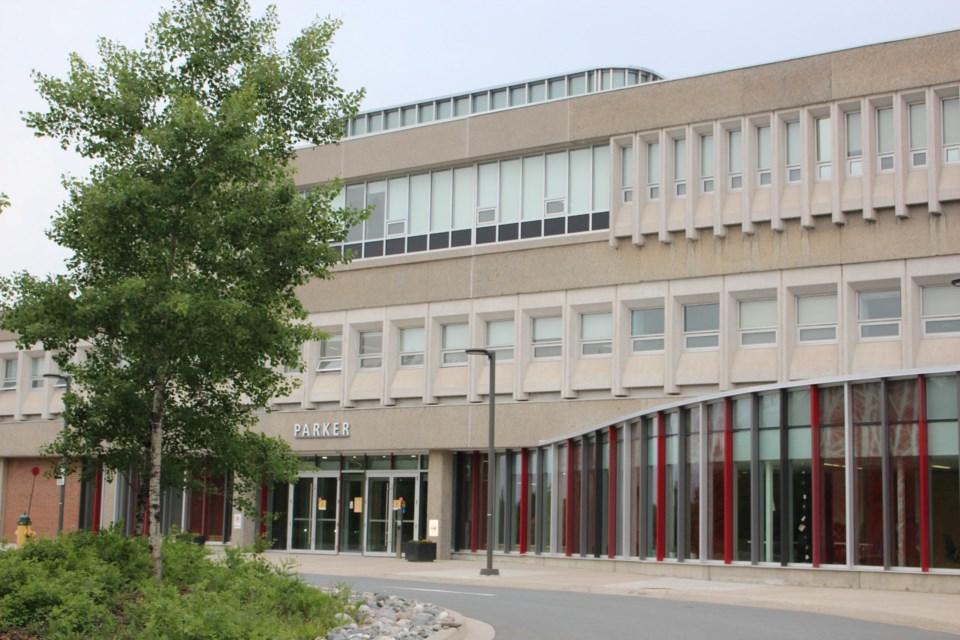The political situation in the United States has left some members of Laurentian University’s academic community saying they’re unwilling to travel south of the border.
“I'm not considering in the near future travelling south of the border, because it would be just too cumbersome and onerous because of my research,” said Lynne Gouliquer, a sociology professor at Laurentian.
A veteran of the Canadian military, she said part of her research focuses on the LGBT community and the Canadian Armed Forces. Openly trans people are currently being removed from the American military.
“Crossing borders to present on that would be probably not welcome,” Gouliquer said.
The professor made the comments at the May 20 meeting of Laurentian’s senate, of which Gouliquer is a member.
The discussion on the impact of the current political situation in the United States was sparked by a report by professor Abdel Omri, a member of the LU senate who sits on the Council of Ontario Universities.
He provided a summary of a talk and discussion on the impacts of United States policies on academic activities at Ontario universities.
These include American funding cuts to research that may impact cross-border collaborations and the risks Canadian researchers may face in light of U.S. travel advisories.
Tammy Eger, Laurentian’s vice-president, academic, said she too likely won’t be travelling to the United States any time soon.
“I appreciate what you're saying,” she said. “Unless the president orders me to go to the U.S., I'm not going to be travelling to the U.S. Neither will my partner. It's just we don't feel safe to do it, so I hear you.”
Eger said Laurentian issued a memo April 22 around all international travel for university purposes, issuing advice and helping academics with gauging the risks.
Also in April, the Canadian Association of University Teachers (CAUT) put out a memo advising academics against non-essential travel to the United States.
“Given the rapidly evolving political landscape in the United States and reports of individuals encountering difficulties crossing the border, CAUT strongly recommends that academic staff travel to the U.S. only if essential and necessary,” said the memo.
Speaking to Sudbury.com last month following the issuing of the CAUT memo, Laurentian University Faculty Association (LUFA) president Fabrice Colin said he’s also uneasy about the idea of visiting the United States right now.
He pointed to the case of a French researcher who was denied entry to the United States after border officials searched his phone.
“You're aware of that very famous quote, that truth is the first casualty,” Colin said. “I would say that when an authoritarian regime comes into place, academics and intellectuals are the first target, and that's exactly what we're seeing. Unfortunately, it seems it's just history repeating itself.”
Conversations around how research is being impacted by the Trump administration’s policies have been happening at the provincial and federal level, Eger told Laurentian’s senate.
Topics currently being targeted by the Americans include anything to do with EDI (equity diversity and inclusion), the LGBT community, gender, the environment and climate change, but are not limited to that.
“Most recently, I've had colleagues that I used to work with myself with the National Institute for Occupational Safety and Health,” Eger said. “Their research was all a stop. They were walked out, told that they won't be funded anymore.
“So we're just starting to really try to get the full sense of the impact. I think we'll have to figure out how we respond collectively as Ontario and Canada, and then at each institution where there may be support.”
Speaking at the May 20 meeting, Colin asked Laurentian’s administration if there could be any advantages for Canadian universities or LU, including recruiting American academics who are looking to leave their country due to the situation.
Provost Malcolm Campbell said the university is currently recruiting for four positions, and while there may be qualified candidates south of the border, “we don’t want to disadvantage any Canadian candidates.”
“So it's a tricky situation, I would say, to navigate right now, not disadvantaging Canadians for positions here in Canada, while simultaneously being welcoming to colleagues that may find themselves in an awkward position south of the border,” Campbell said. “But as to an explicit strategy here at Laurentian University, there is not one.”
Heidi Ulrichsen is Sudbury.com’s assistant editor. She also covers education and the arts scene.
